
Northern Review
Scope & Guideline
Exploring the Depths of Northern Knowledge
Introduction
Aims and Scopes
- Indigenous Rights and Perspectives:
The journal focuses on the rights, governance, and cultural perspectives of Indigenous peoples in the northern regions, emphasizing self-determination and the integration of traditional knowledge into contemporary practices. - Environmental and Resource Management:
Research often centers on the sustainable management of natural resources, exploring the intersection of environmental challenges, policy, and community well-being in northern contexts. - Cultural Heritage and Identity:
The Northern Review highlights the importance of cultural heritage, oral histories, and identity among northern populations, showcasing how these elements contribute to resilience and community cohesion. - Policy and Governance:
The journal critically examines local, national, and international policies affecting the Arctic, with a particular focus on governance structures and the implications for sovereignty and community engagement. - Socio-Economic Development:
There is a consistent focus on the socio-economic challenges and opportunities facing northern communities, including education, employment, and health disparities.
Trending and Emerging
- Indigenous Self-Determination and Governance:
There is a growing emphasis on Indigenous self-determination, governance structures, and frameworks that empower Indigenous communities, indicating a shift towards recognizing and advocating for Indigenous rights. - Climate Change and Its Socio-Economic Impact:
Recent articles are increasingly addressing the effects of climate change on northern communities, particularly how it intersects with social, economic, and cultural factors, reflecting an urgent need for research in this area. - Youth Engagement and Resilience:
Research focusing on youth, their resilience, and their roles in community development is trending, highlighting the importance of investing in the next generation to address socio-economic challenges. - Interdisciplinary Approaches:
Emerging themes are increasingly interdisciplinary, combining insights from various fields such as anthropology, environmental science, and policy studies to address complex issues facing northern communities. - Cultural Revitalization and Language Preservation:
A notable trend is the focus on revitalizing Indigenous languages and cultural practices, underscoring the importance of cultural identity in fostering community resilience.
Declining or Waning
- Historical Overviews of Non-Indigenous Influences:
Although historical perspectives are essential, there is a noticeable reduction in papers focused solely on the historical impacts of non-Indigenous entities, as the journal increasingly prioritizes Indigenous narratives and contemporary issues. - General Environmental Studies:
Research that does not specifically link environmental studies to Indigenous practices or governance appears to be less frequent, suggesting a narrowing of focus towards more integrated approaches. - Non-Indigenous Educational Frameworks:
Papers examining traditional educational systems without linking them to Indigenous perspectives or contexts are becoming less common, as the journal shifts towards emphasizing culturally relevant education.
Similar Journals

Geographical Review of Japan-Series B
Navigating the Complexities of Japan's GeographyGeographical Review of Japan-Series B, an esteemed publication by the Association of Japanese Geographers, serves as a vital platform for scholarly discourse in the field of geography, focusing on the nuanced socio-economic and environmental dynamics of Japan. With the ISSN 1883-4396, this journal aims to publish rigorous, peer-reviewed research that contributes to understanding Japan's geographic phenomena and informing policy-making. Although it is not an open-access journal, it provides insights accessible to researchers, professionals, and students seeking a deeper engagement with regional and international geographical discussions. With its commitment to excellence in academic contribution, the Geographical Review of Japan-Series B remains an essential resource for those dedicated to advancing geographical knowledge in Japan and beyond.

Aboriginal Policy Studies
Connecting Scholars to Indigenous Policy ChallengesAboriginal Policy Studies is a pioneering open-access journal published by the University of Alberta that has been dedicated to the examination of issues, policies, and practices affecting Aboriginal communities in Canada and beyond since 2011. With its ISSN 1923-3299, this journal serves as a vital platform for researchers, professionals, and students committed to advancing knowledge and understanding of Indigenous rights, governance, and social justice. The journal aims to foster interdisciplinary discourse by publishing high-quality original research, critical analyses, and case studies that address the complexities of Aboriginal policy. Given its commitment to accessibility and rigor, Aboriginal Policy Studies is an essential resource for anyone engaged in the fields of sociology, political science, and Indigenous studies, striving to amplify Indigenous voices within scholarly dialogue.

CONTEMPORARY PACIFIC
Navigating the Intersections of Culture and Politics in the PacificCONTEMPORARY PACIFIC is a prestigious academic journal published by University of Hawaii Press, focusing on interdisciplinary studies within the realms of Geography, Sociology, and Political Science. Since its inception in 1992 and continuing through to 2023, the journal has been a vital platform for researchers and scholars aiming to explore the dynamic and multifaceted issues facing the Pacific region. With an impact factor that places it within the Q3 category for both Geography, Planning and Development, and Sociology and Political Science, it holds an essential role in contributing to the scholarly discourse in these fields. The journal is indexed in Scopus, with rankings that reflect its ongoing relevance and contribution, boasting a 55th percentile rank in Sociology and Political Science and a 39th percentile in Geography, Planning and Development. Although it does not offer Open Access options, the journal remains an invaluable resource for those dedicated to understanding the complex narratives of the Pacific, providing a rich tapestry of articles that are both insightful and impactful for researchers, professionals, and students alike.
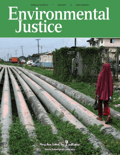
Environmental Justice
Championing social justice in the face of environmental challenges.Environmental Justice is a leading interdisciplinary journal published by MARY ANN LIEBERT, INC that provides a vital platform for the exploration of environmental issues through the lens of social equity and justice. With a strong focus on the intersection of geography, health, and policy, this journal spans topics from spatial inequality to public health implications related to environmental risks. Since its inception in 2008, the journal has gained recognition, achieving a Q1 ranking in Geography, Planning, and Development and a Q2 ranking in both Health, Toxicology, and Mutagenesis as well as Management, Monitoring, Policy, and Law. The journal is an essential resource for researchers, policymakers, and practitioners alike, reflecting the increasing importance of environmental justice in addressing global challenges. Although it does not operate under an open-access model, the comprehensive insights published in Environmental Justice are instrumental for advancing scholarly discourse and practical applications in the field.
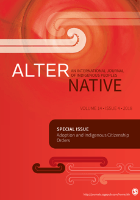
Alternative-An International Journal of Indigenous Peoples
Connecting Scholars to the Heart of Indigenous StudiesAlternative: An International Journal of Indigenous Peoples is a leading academic journal published by SAGE Publications Ltd that focuses on the complexities, narratives, and contemporary issues surrounding Indigenous communities globally. With an impressive Q1 ranking in Anthropology, Cultural Studies, and History, this journal stands at the forefront of interdisciplinary research, making significant contributions to understanding Indigenous peoples’ rights, cultural heritage, and social justice. Spanning years from 2014 to 2024, it serves as a vital platform for researchers, professionals, and students engaged in discussions and studies related to Indigenous knowledge systems and cultural dynamics. The journal operates under rigorous peer-review standards, ensuring high-quality scholarly articles that resonate within the academic community. Although it currently does not offer open access, the valuable insights and research findings presented within its pages are indispensable for anyone dedicated to advancing the field of Indigenous studies.
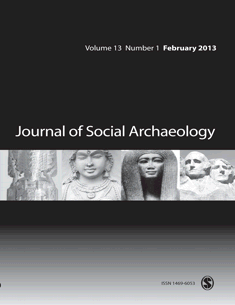
JOURNAL OF SOCIAL ARCHAEOLOGY
Bridging Disciplines to Illuminate HistoryJOURNAL OF SOCIAL ARCHAEOLOGY, published by SAGE Publications Ltd, stands at the forefront of interdisciplinary research where archaeology meets social science. With an ISSN of 1469-6053 and an E-ISSN of 1741-2951, this esteemed journal provides a platform for investigation into the social dimensions of past human behaviors and interactions. Since its inception in 2001, it has garnered substantial recognition, currently ranked in the Q1 quartile in both Archaeology and Arts and Humanities (miscellaneous) categories for 2023, positioning it among the top-tier journals within these fields. Additionally, its Scopus rankings, where it holds a notable placement of #35/354 in Social Sciences and #124/552 in Arts and Humanities, underscore its significant impact, falling within the 90th and 77th percentiles, respectively. The journal aims to foster innovative research that challenges traditional archaeological narratives and enriches our understanding of the social constructs and cultural contexts of the past. Although not open access, JOURNAL OF SOCIAL ARCHAEOLOGY remains an essential resource for scholars, professionals, and students dedicated to unlocking the complexities of human history through a social lens.
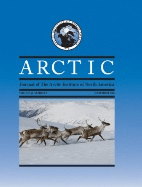
ARCTIC
Illuminating the Arctic: Research, Culture, and EcologyARCTIC, published by the ARCTIC INSTITUTE OF NORTH AMERICA, is a distinguished journal dedicated to advancing the understanding of Arctic environments, ecosystems, and cultures. With an ISSN of 0004-0843 and E-ISSN 1923-1245, this journal has been a cornerstone in the field since its inception in 1973, continuously contributing to the disciplines of ecology, evolution, behavior, and systematics. Based in Canada at the University of Calgary, ARCTIC not only serves as a vital resource for researchers and professionals but also engages students with impactful studies and findings regarding the unique challenges faced by Arctic regions. Currently ranked in the Q3 quartile for Ecology, Evolution, Behavior and Systematics, and sitting at the 46th percentile in Scopus rankings within its category, ARCTIC remains dedicated to quality research while fostering interdisciplinary dialogue. Although it does not offer open access, the depth and breadth of the articles published here are invaluable for those invested in Arctic research and its ecological implications, making it an essential read for anyone seeking to contribute to or understand the complexities of the Arctic environment.

Northern Clinics of Istanbul
Connecting scholars to shape the future of medicine.Northern Clinics of Istanbul is an esteemed open-access journal dedicated to advancing knowledge within the field of medicine, specifically focusing on miscellaneous areas of general medicine. Published by KARE PUBL since 2014, it provides a vital platform for researchers, healthcare professionals, and students to share innovative findings and foster academic dialogue. With its ISSN 2148-4902 and E-ISSN 2536-4553, the journal has garnered attention in the academic community, earning a reputable Q4 quartile ranking in the category of Medicine (Miscellaneous) for the year 2023 and a Scopus rank of #497 out of 636. Based in Istanbul, Turkey, the journal is committed to accessibility and relevance, making significant contributions to the global medical discourse. Northern Clinics of Istanbul aims to serve as an interdisciplinary hub for innovative research, promoting the dissemination of knowledge and enhancing collaborative efforts among scholars. Join us in exploring the latest insights that are shaping healthcare today.
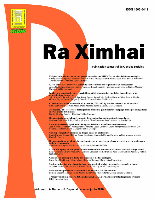
Revista Ra Ximhai
Connecting Cultures: A Platform for Indigenous ScholarshipRevista Ra Ximhai is a distinguished academic journal published by Universidad Autónoma Indígena de México, specializing in interdisciplinary studies related to indigenous knowledge, culture, and socioeconomic issues. Since its inception as an Open Access publication in 2005, the journal has championed the dissemination of research that amplifies indigenous voices and perspectives, fostering an enriched understanding of various fields including anthropology, sociology, and environmental studies. Although it does not currently have an H-index or Scopus rankings, Revista Ra Ximhai remains vital for researchers, professionals, and students who are engaged in or studying indigenous rights and cultural preservation. With a commitment to scholarly excellence and accessibility, the journal makes significant contributions to its field, making it an invaluable resource for those dedicated to the advancement of knowledge regarding indigenous communities, especially in Latin America.
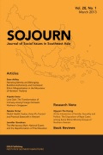
SOJOURN-Journal of Social Issues in Southeast Asia
Fostering Scholarly Dialogue on Regional ChallengesSOJOURN - Journal of Social Issues in Southeast Asia is a distinguished academic publication that has been at the forefront of exploring and analyzing the complex social issues within the Southeast Asian region since its inception. Published by the Institute of Southeast Asian Studies (ISEAS)Anthropology, Sociology, and Political Science. With its ISSN 0217-9520 and E-ISSN 1793-2858, SOJOURN holds a Q3 ranking in both anthropology and sociology categories, reflecting its significant contribution to the literature and its commitment to enhancing understanding of the societal dynamics in Southeast Asia. Although currently not an open-access journal, it provides a vital platform for researchers, professionals, and students dedicated to looking beyond surface issues and diving deep into the cultural and political landscapes of the region. As the journal continues to publish until 2024, it remains an essential resource for knowledge and scholarship, fostering academic dialogue and innovative research in a rapidly evolving socio-political environment.